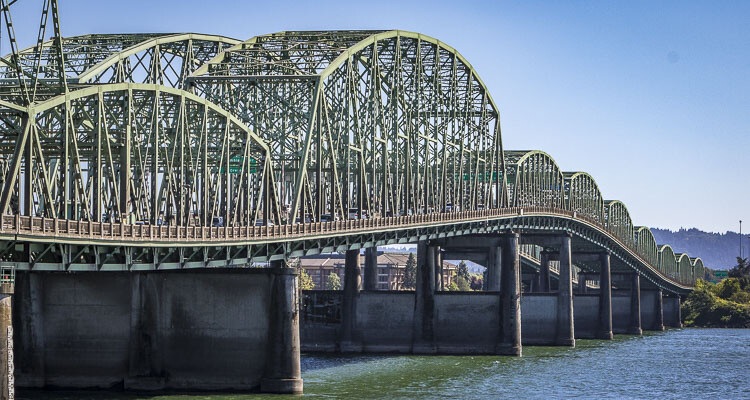
The IBR project team is seeking LPA approval for their from Portland Metro, Portland City Council and Vancouver City Council and other partner governments before sending it through the National Environmental Policy Act process
The Just Crossing Alliance (JCA) recently released a sign on letter from the alliance expressing concerns and disappointments with the current locally preferred alternative (LPA) proposal of the Interstate Bridge replacement project.
The Interstate Bridge Replacement Program (IBR) project team recently announced that they plan to seek LPA approval for their high-bridge proposal from Portland Metro, Portland City Council and Vancouver City Council and other partner governments before sending this proposal through the National Environmental Policy Act process.
In their sign on letter, JCA points out that the NEPA process is designed to vet projects for their environmental impacts before bringing them to the LPA process. By reversing this process the IBR project team not only puts the proposal at risk for NEPA violation but also refuses to examine alternative project proposals such as the low-bridge and immersed tunnel designs which are less expensive phaseable alternatives.
The current bridge proposal is a monolithic project with an unknown price tag and an unclear financial payment plan. A high bridge project cannot be phased, meaning the entire bridge will have to be built at one time and paid for at one time. As we learned with the CRC project in the early 2010’s high bridge projects of this capacity often carry price tags much greater than estimated. JCA is asking the IBR partners to vote against the project until the project prepares updated cost estimates for the high bridge and a complete finance plan for how these costs will be funded. We need to have a clear understanding of the impact of tolls from an equity standpoint and how much tolling will contribute to the funding of the project. Until an honest and viable financial plan for the high bridge and other bridge alternatives are presented it is irresponsible to go forward with any one proposal.
Member of JCA Joe Cortright, president and founder of Impresa a consulting firm specializing in regional economic analysis, states “The IBR would be the most expensive infrastructure project in the region’s history, and the two state DOT’s have failed to do even the most basic financial planning. The project’s traffic forecasts are inaccurate, the cost estimates are based on decade-old engineering work, and the selected high bridge option is the riskiest, most expensive and least affordable approach to solving this problem. Before we commit to a $5 billion project, we need to get better information, and more robust alternatives.”
Among substantial financial and planning concerns, JCA members are also aware of multiple accessibility and environmental short-comings with the high bridge alternative.
Sarah Iannarone, executive director of The Street Trust, also a founding member of the Just Crossing Alliance is one such member. “While we are excited that the IBR team is supporting light rail, we’re concerned that it should be extended to serve Clark College and Washington’s School for the Blind. We also worry that the additional freeway capacity in the form of ‘auxiliary’ lanes (some of which could be as long as 5 miles long) will add as much as 1.3 million metric tons of carbon over their lifetime, equivalent to the annual emissions of 250,000 homes.” She continues, “We need to ensure the project is designed to reduce congestion and get our communities moving where they need to go for the long-term.”
Anna Kahler, JCA Alliance manager states, “With so many meaningful shortcomings and concerns, we are asking Portland Metro, the City of Portland, and the City of Vancouver and other local government partners to vote no on the current LPA until other bridge alternatives are presented and put through the NEPA process before deciding on an LPA. For all the reasons stated above and more, it would be irresponsible to move forward with the IBR project as it stands.”
To learn more about the Just Crossing Alliance, visit justcrossing.org.
Also read:
- IBR only has single firm interested in managing the project to replace I-5 BridgeRep. John Ley reports on serious concerns with the I-5 Bridge replacement project, including limited contractor interest, rising tolls, and a 15-year timeline.
- Busy pavement season ahead on Vancouver streetsThe city of Vancouver is set to repave and preserve 76 lane miles across 20 neighborhoods in summer 2025, with ADA upgrades and community notices throughout.
- State representative: Expect sticker shock when Interstate Bridge project officials reveal price, tolling plansAt a town hall in Battle Ground, Rep. John Ley warned of major cost increases and tolling burdens tied to the Interstate Bridge replacement project.
- Opinion: Washington state lawmakers increase the cost of driving – againBob Pishue of Mountain States Policy Center argues that new vehicle and fuel taxes in Washington will raise driving costs while diverting funds away from roads.
- Overnight full closure of I-5 near Woodland for bridge inspection, May 6WSDOT will fully close southbound I-5 near Woodland overnight on Tuesday, May 6 for a bridge inspection using a chain drag test.









